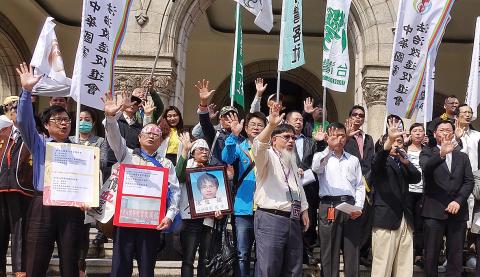Members of the Taiwan Jury Association, along with members of judicial reform advocacy groups, yesterday gathered in front of the Judicial Yuan building, urging the public to join a march on May 5 to demand the implementation of the jury system in Taiwan.
The National Congress on Judicial Reform between November 2016 and August last year gathered experts to discuss whether a jury system or lay assessor system would be more suitable as a civic participation system for Taiwan, but they did not reach a consensus.
The government later decided to establish a citizen judge system and proposed a draft act in November last year.

Photo: Liu Hsin-de, Taipei Times
An alliance promoting the jury system, led by the association and including the Judicial Reform Foundation, the Taiwan Judicial Reform Care Association and the Anti-Judicial Abuse Action Alliance, urged the government to implement a jury system and to believe in the public’s collective wisdom.
Taiwan Jury Association chairman Chang Ching (張靜), an attorney and former National Conference on Judicial Reform committee member, said the votes in favor of a jury system and a lay assessor system were tied in the conference, so the association is opposed to the government’s insistence on adopting a citizen judge system in disregard of other opinions.
“The jury system is the mainstream judicial trial system and 52 nations have embraced it,” association founder and an attorney Jerry Cheng (鄭文龍) said. “We should use people’s wisdom to conduct fair trials.”
Calling the Judicial Yuan the “private law yuan,” Cheng said the Judicial Yuan serves the exclusive rights of court judges and not those of the public.
The citizen judge system is “fake judicial reform,” because it requires three court judges and six citizen judges, which is likely to result in the court judges still leading the decisions, Cheng added.
In simulated court sessions in preparation for the citizen judge system, there have even been cases in which the court judge scolded the citizen judges, he said.
“Only with a jury system with the collective wisdom of 12 jury members from all walks of life can we prevent judges from being bribed,” Cheng said, adding that he believes a jury system can help prevent miscarriages of justice.
Hu Shih-ho (胡世和), uncle of Hung Chung-chiu (洪仲丘), an army corporal who died of abuse while serving in the military in 2013, prompting tens of thousands of people to attend a protest demanding legal reform, said the case was moved from military court to a civilian court due to public pressure, but the judge did not sentence the defendants or find the witness guilty of perjury.
People should not only be allowed to express themselves in court, but should have the right to vote as a way to balance the exclusive rights of judges, he said.

A preclearance service to facilitate entry for people traveling to select airports in Japan would be available from Thursday next week to Feb. 25 at Taiwan Taoyuan International Airport, Taoyuan International Airport Corp (TIAC) said on Tuesday. The service was first made available to Taiwanese travelers throughout the winter vacation of 2024 and during the Lunar New Year holiday. In addition to flights to the Japanese cities of Hakodate, Asahikawa, Akita, Sendai, Niigata, Okayama, Takamatsu, Kumamoto and Kagoshima, the service would be available to travelers to Kobe and Oita. The service can be accessed by passengers of 15 flight routes operated by

Alain Robert, known as the "French Spider-Man," praised Alex Honnold as exceptionally well-prepared after the US climber completed a free solo ascent of Taipei 101 yesterday. Robert said Honnold's ascent of the 508m-tall skyscraper in just more than one-and-a-half hours without using safety ropes or equipment was a remarkable achievement. "This is my life," he said in an interview conducted in French, adding that he liked the feeling of being "on the edge of danger." The 63-year-old Frenchman climbed Taipei 101 using ropes in December 2004, taking about four hours to reach the top. On a one-to-10 scale of difficulty, Robert said Taipei 101

Taiwanese and US defense groups are collaborating to introduce deployable, semi-autonomous manufacturing systems for drones and components in a boost to the nation’s supply chain resilience. Taiwan’s G-Tech Optroelectronics Corp subsidiary GTOC and the US’ Aerkomm Inc on Friday announced an agreement with fellow US-based Firestorm Lab to adopt the latter’s xCell, a technology featuring 3D printers fitted in 6.1m container units. The systems enable aerial platforms and parts to be produced in high volumes from dispersed nodes capable of rapid redeployment, to minimize the risk of enemy strikes and to meet field requirements, they said. Firestorm chief technology officer Ian Muceus said

MORE FALL: An investigation into one of Xi’s key cronies, part of a broader ‘anti-corruption’ drive, indicates that he might have a deep distrust in the military, an expert said China’s latest military purge underscores systemic risks in its shift from collective leadership to sole rule under Chinese President Xi Jinping (習近平), and could disrupt its chain of command and military capabilities, a national security official said yesterday. If decisionmaking within the Chinese Communist Party has become “irrational” under one-man rule, the Taiwan Strait and the regional situation must be approached with extreme caution, given unforeseen risks, they added. The anonymous official made the remarks as China’s Central Military Commission Vice Chairman Zhang Youxia (張又俠) and Joint Staff Department Chief of Staff Liu Zhenli (劉振立) were reportedly being investigated for suspected “serious